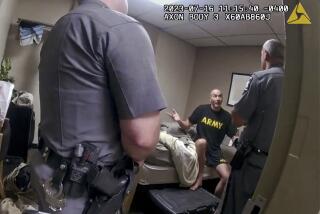Marines who suffered brain injuries doubled risk of PTSD, study finds
Up to a fifth of U.S. service members who served in Iraq and Afghanistan have come home with a blast-related concussion or post-traumatic stress disorder — or both.
A study published Wednesday in the journal JAMA Psychiatry helps detail the relationship between the two conditions.
Marines who suffered mild traumatic brain injuries while deployed were roughly twice as likely to get PTSD, researchers found.
One likely explanation is that the bomb blasts, the most common cause of brain injuries during the wars, are psychologically traumatizing as well.
In addition, structural changes in the brain after a head injury may increase the likelihood of developing PTSD and decrease the chances of recovery, said Dr. Dewleen Baker, a co-author of the study and research director at the Veterans Affairs Center of Excellence for Stress and Mental Health in San Diego.
The study followed 1,648 Marines from four battalions in Southern California as they deployed to war and returned between 2008 and 2012.
Each Marine was assessed for PTSD and other mental health issues a month before deployment, then again three to six months after returning. A total of 327 Marines — about 20% — reported having suffered at least one traumatic brain injury during their deployment.
Not surprisingly, Marines who were already suffering from PTSD when they went to Iraq or Afghanistan, and then saw intense combat, had the highest risk of testing positive for PTSD once they came home. Adding a brain injury raised the risk from 23% to 34%.
At the other extreme — Marines who were deployed without any pre-existing mental health problems and experienced minimal combat — the risk of developing PTSD was minimal, with or without a brain injury. Most of the Marines fell somewhere in the middle.
Twitter @AlanZarembo
ALSO:
Obesity may be a side effect of PTSD in women, study finds
Can you get PTSD from watching media coverage of an event? Maybe
1 in 4 stroke victims experiences PTSD, study finds







